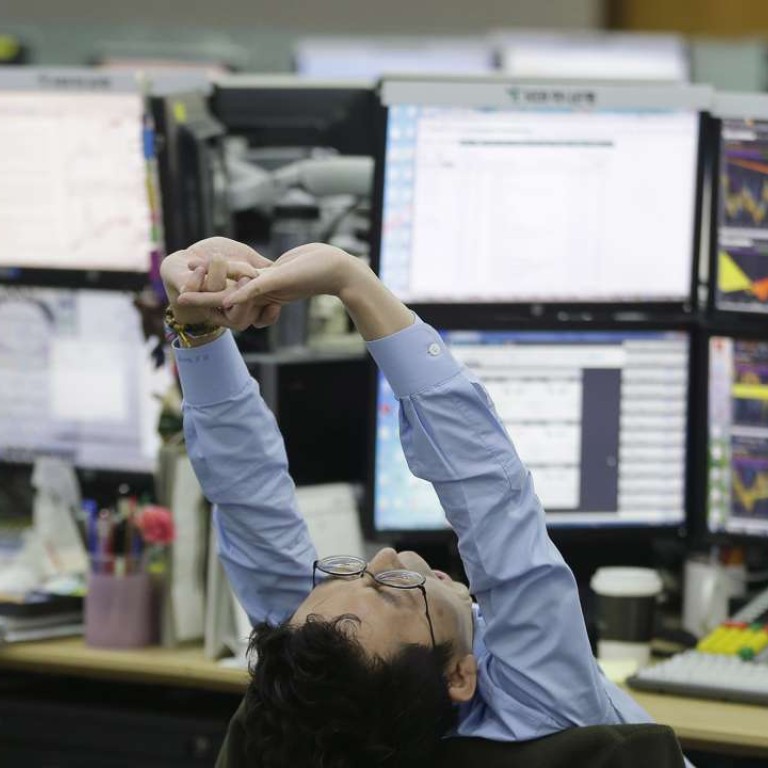
New | US dollar weakens, Asian stocks decline as concern deepens over Trump’s policies
Declines in Asian equity markets bode ill for Hong Kong when trading resumes on Wednesday, and for mainland China when traders return on Friday
The US dollar weakened against major currencies for the second day on Tuesday, weighing down on the stock prices of Asian exporters and technology firms, following Wall Street declines amid concerns over Donald Trump’s tightening of US immigration rules.
The dollar weakened by as much as 0.5 per cent to ¥113.24 against the yen, dropping by a combined 1.4 per cent since Friday. The US currency also weakened 0.2 per cent against the euro, dropping to 1.0715, while falling 0.1 per cent against the sterling, declining to 1.2504 per pound.
In the offshore yuan market, the dollar bought 6.8548 yuan, down 0.1 per cent from Monday’s 6.8633 yuan. Onshore yuan trading has been closed since January 27 for Lunar New Year holidays.
“Investor sentiment has quickly turned, as Tumpenomics’ rally has given way to a vote of no confidence from investors who are growing leery of Trump’s agenda and are restless about the lack of focus on the fiscal front,” said Stephen Innes, a senior currency trader at Oanda Asia Pacific.
Currency market gyrations spilled over to Asian equities during the holiday-shortened trading week, with bourses closed in Hong Kong, Shanghai, Shenzhen and Taiwan.
Stock indexes fell across Asia, with the Nikkei 225 Index dropping 1.7 per cent in Tokyo to close at 19,041.34. The Kospi Index in Seoul fell 0.8 per cent to end at 2,067.57.
Technology stocks led declines in Tokyo, with NEC Corp sinking 17.4 per cent to 261 yen, while Canon Inc dropped 1.4 per cent to 3,345 yen.
In the meantime, US stock futures declined further in pre-market trading. S&P 500 futures dropped 0.1 per cent to 2,272.75. Dow Industrial Average futures also lost 0.1 per cent to 19,862.00. Nasdaq-100 futures fell 0.2 per cent to 5,116.75.
The CBOE Volatility Index, a measure of investor anxiety, jumped 12 per cent on Monday, the biggest increase in three months after Trump issued an executive order banning immigrants and refugees from seven Muslim-majority countries.
In the latest development, Acting Attorney General Sally Yates -- a holdover from the Obama administration -- defied Trump’s ban and questioned its legality, an act of push back that got her fired. He’d since appointed another Obama appointee Dana Boente to the post, who instructed the Justice Department’s lawyers to defend the immigration ban against legal challenges.
The Dow Jones Industrial Average plunged by the most in three months, declining 122.65 points to 19,971.13 on Monday. The price of gold rose for the first day in five, with April gold futures settling at US$1,196 an ounce.
“If the surge in CBOW volatility index and the climb back toward the US$1,200 level for god tells me anything, it’s that Asian markets are poised for declines,” said Pan Jingyi, a strategist for IG Group. “Chinese and Hong Kong markets will be glad to sit out this reactive stage on Tuesday.”
The jump in global volatility bodes ill for the equity bourses of Hong Kong when trading resumes Wednesday, and mainland China when traders return on Friday.
“Moderation is not promised, with the increasing uncertainty we have seen since Trump’s inauguration,” Pan said.
The Hang Seng Index closed little change on January 27, closing the Year of the Monkey that just ended up by 21 per cent to 23,360.78. The Hang Seng China Enterprise Index rose 21.73 per cent in the same period to 9.804.05.
“There’s an increasing level of unease amongst investors that the recent executive orders are eroding minted political relationships abroad and will have negative impact on US trade negotiation,” Oanda’s Innes said.

